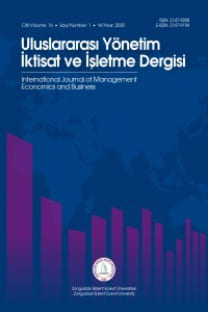TÜRKİYE’DE ULUSLARARASI FİNANSAL RAPORLAMA STANDARTLARI UYGULAMASININ FİNANSAL ORANLARA ETKİLERİNİN ANALİZİ
Türkiye’de halka açık işletmeler ve borsada işlem gören işletmeler, 2005 yılından itibaren Uluslararası Muhasebe/Finansal Raporlama Standartlarını uygulamaya başlamıştır. Uluslararası muhasebe standartlarının kullanımı finansal tablolarda sınıflama, değerleme ve açıklamaya yönelik değişikliklere neden olmuştur. Ulusal standart uygulamaları ile uluslararası standart uygulamalarının finansal oranlardaki değişiminin anlamlılığı test edilmiştir. Analizde 15 finansal oran, aynı 84 işletme için, ulusal standartların kullanıldığı 6 yıllık dönem ve uluslararası standartların uygulandığı 6 yıllık dönem için hesaplanarak analize tabi tutulmuştur. Analiz sonucunda özsermaye karlılığı, aktif karlılığı, toplam varlıklar/ özsermaye, toplam borçlar/özsermaye, toplam borçlar/varlıklar karlılık oranları ve kaldıraç oranları oranları için anlamlı bir ilişki bulunmuştur.
Anahtar Kelimeler:
UMS, UFRS, Finansal Oran, Finansal Yapı
EFFECTS OF INTERNATIONAL FINANCIAL REPORTING STANDARDS APPLICATION ON FINANCIAL RATIOS IN TURKEY
Public companies and listed companies in Turkey have started to apply International Accounting/Financial Reporting Standards since 2005. Use of international accounting standards has led to changes in classification, valuation and disclosure in the financial statements. In this study, the significance of change in financial ratios has been tested for national standard applications and international standard applications. In the analysis 15 financial ratios have been calculated for the same 84 companies and analysed for 6-years period when national standards were in use and for 6-years period when international standards were in use. As a result of the analysis significant relation has been found return on equity, return on total assets, total assets/equity, total liabilities/equity, total liabilities/total assets ratios
Keywords:
IFRS, IAS, Financial Ratios, Financial Structure,
___
- Accounting system application general communique no 1 (1992). Official Gazette of Republic of Turkey Repeat Issue, No:21447.
- Bilginoglu, F. (1996). Türk Muhasebe Hukuku’nun kavramsal çerçevesi. Sosyal Bilimler Dergisi, II (2-3), 94-100.
- Bylaw on financial reporting of insurance and re-insurance companies and retirement companies (2007). Official Gazette of Republic of Turkey, Issue: 26852.
- Bylaw on procedures and rules related to banks accounting practices and keeping of documents (2006). Official Gazette of Republic of Turkey, Issue: 26333.
- Callao, S., Jarne, J. I., & La´ınez, J. A. (2007). Adoption of IFRS in Spain: Effect on the comparability and relevance of financial reporting. Journal of International Accounting, Auditing and Taxation, 16(2), 148–178.
- Capital markets board of turkey communique (2008), Seri: XI, No: 29, Official Gazette of Republic of Turkey, No:26842.
- Celik M., Aygoren, H., & Uyar, S. (2007, March). The impact of international financial reporting standards on financial statements and financial ratios. The Balkan Countries 1. International Conference on Accounting and Auditing, Edirne.
- Communique on rules related to financial reporting in capital markets (2008). Serie: XI, No: 29, Official Gazette of Republic of Turkey, No:26842.
- Decree law about organization and duties of public supervision accounting and audit standards institution (2011). Decree Number: KHK/660, Official Gazette of Republic of Turkey, Issue:28103.
- Goodwin, J., Ahmed, K., & Heaney, R. (2008). The effects of international financial reporting standards on the accounts and accounting quality of Australian firms: A retrospective study. Journal of Contemporary Accounting & Economics, 4(2), 89-119.
- International Accounting Standards Board, (2013). http://www.ifrs.org.
- Lantto, A. M. & Sahlström, P. (2009). Impact of international financial reporting standard adoption on key financial ratios. Accounting and Finance, 49(2), 341–361.
- Public Supervision (2012). Accounting and audit standards institution, http://www.kgk.gov.tr
- ISSN: 2147-9208
- Başlangıç: 2005
- Yayıncı: Zonguldak Bülent Ecevit Üniversitesi
Sayıdaki Diğer Makaleler
Türkiye’de para politikalarının bankaların risk yüklenimleri üzerindeki etkileri
Mehmet ÇINAR, Nejla AKLAN ADANUR, Hülya AKAY KANALICI
Avrupa yerel yönetimler özerklik şartı çerçevesinde Türkiye’de mali özerklik
Mehmet Dağ, İbrahim Güray YONTAR
TURİZM İŞLETMELERİNE YÖNELİK İŞ İLANLARININ İÇERİK ANALİZİ YÖNTEMİYLE İNCELENMESİ
İslam ülkeleri arasında işbirliğine giden yolda yeni arayışlar
İSLAM ÜLKELERİ ARASINDA İŞBİRLİĞİNE GİDEN YOLDA YENİ ARAYIŞLAR
TÜRKİYE’DE PARA POLİTİKALARININ BANKALARIN RİSK YÜKLENİMLERİ ÜZERİNDEKİ ETKİLERİ
Nejla ADANUR AKLAN, Hülya KANALICI AKAY, Mehmet ÇINAR
TEDARİK ZİNCİRİ İLİŞKİLERİNDE BAŞARI FAKTÖRÜ OLARAK GÜVEN UNSURU: KAVRAMSAL BİR ÇALIŞMA
